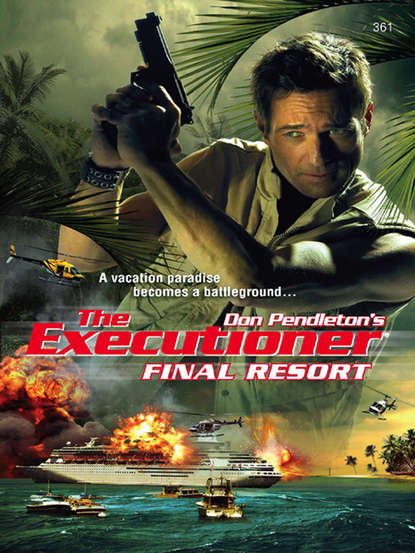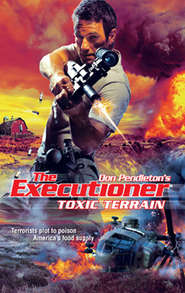По всем вопросам обращайтесь на: info@litportal.ru
(©) 2003-2025.
✖
Final Resort
Автор
Год написания книги
2019
Настройки чтения
Размер шрифта
Высота строк
Поля
The first blast sounded like a half-pound charge of C-4 or the equivalent. It echoed from the east side of the camp, meaning that Pyle could not investigate despite his shock and sudden, urgent curiosity. The first rule of guard duty in the Corps was to stay alert and man the post assigned, no matter what distractions surfaced in the course of any given shift. Pyle couldn’t leave his beat along the camp’s northern perimeter unless directly ordered by the Sergeant of the Guard or someone who outranked him.
Pyle was thinking accident when two more high-explosive detonations rocked the base, one on the southern side, and one—unless Pyle missed his guess—not far from the command post.
And it wasn’t any goddamned accident.
He knew that, now.
Pyle jacked a round into the chamber of his M-16 and watched the wire, remembering the orders that had been drilled into him from day one of his posting to Guantanamo. The base and all that it contained was U.S. property, an island in a hostile sea of red, surrounded by the enemy.
That rule had been in place since 1959, around the time Pyle’s father was born, and there had never been an assault on the base.
Until now.
Three blasts, plastic explosives, and if Pyle had any lasting doubts, the sounds of automatic weapons fire confirmed what he already knew: this wasn’t any exercise designed to test the camp’s security procedures.
This was happening. The shit was coming down, and—
Pyle saw movement, fifty yards or so beyond the razor-wire perimeter he’d been assigned to guard. Raising his M-16, he sighted on the spot and saw a man rise from the undergrowth out there, with something balanced on his shoulder.
By the time Pyle recognized the object as a rocket launcher, triggering a short reflexive burst of 5.56 mm rounds in vain, the nose-heavy projectile was already hurtling toward him. All that he could do was hit the deck.
And pray.
1
Blue Ridge Mountains, Virginia
Mack Bolan listened as the all-news station playing on the Ford Explorer’s radio kept coming back to it. Grim bulletins from Cuba, where a band of gunmen loosely dubbed insurgents had apparently stormed Camp X-Ray—the controversial, semisecret facility where U.S. Marines and CIA agents had penned alleged terrorist suspects since America’s invasion of Afghanistan, in the wake of the 9/11 skyjacking raids. Civil libertarians called the military prison an illegal concentration camp and torture center, whose inmates were held without charges or counsel, some still publicly unnamed after all those years.
Administrators airily dismissed the charges, citing precedent from both world wars to justify their actions, and the controversy showed no signs of winding down while Camp X-Ray survived.
But now, it seemed, someone had tried another angle of attack to bring it down.
The early news was spotty, as expected. Getting any word out of Guantanamo was difficult enough, much less when the Marines and comrades from the Company were agitated by embarrassment. Bolan guessed that Hal Brognola would have the whole story—or most of it, at any rate—when he arrived at Stony Man Farm.
“YOU MADE GOOD TIME,” Brognola said, shaking hands with Bolan on the farmhouse porch.
“It sounded urgent,” Bolan said. “And I was in the neighborhood.”
Almost, considering that Baltimore was more or less in Washington’s backyard, both cities reasonably close to where the two men stood in summer sunshine, scanning cultivated fields to the north and west.
Brognola hadn’t come to meet him on the porch alone. Beside the man from Justice stood the Farm’s mission controller, Barbara Price. She had a private smile for Bolan, gripped his hand a heartbeat longer than was strictly necessary, then stepped back. No comment necessary.
“Bear’s waiting for us in the War Room,” Brognola said. “Do you want something to eat or drink, before we start? A chance to freshen up?”
“I’m fresh enough,” Bolan replied. “Let’s do it.”
“Right.”
They stepped inside the building and headed to the War Room, where Aaron Kurtzman, Stony Man’s computer wizard, was waiting. A spinal gunshot, suffered in a raid that nearly doomed the Farm, had left him confined to a wheelchair for life, though it failed to snuff out his gregarious spirit. If Price was Stony Man’s soul, then Kurtzman—“the Bear,” to his friends—was its spark and its wry sense of humor.
Even so, he spared them any jokes that afternoon, greeting Bolan with a solemn face and a handshake strengthened by years of propelling himself on four wheels. Kurtzman shunned all the motorized scooters and chairs, determined to maintain the muscles that remained within his personal control.
Bolan sat at one end of a conference table that could seat a dozen comfortably, fifteen in a pinch. Brognola sat to his left, with Price directly opposite. Kurtzman assumed his place at the computer console, lowering a wide screen from its ceiling slot, at the table’s far end.
“Is this about Guantanamo?” Bolan asked.
“Yes, and no,” Brognola said. “It’s too late for prevention, and that isn’t our department, anyway. We’ll leave that to the Corps and hope they get the bugs ironed out. No matter what, the raid’s a fact of life—or history, by now, I guess you’d say.”
“But it’s not over,” Bolan said.
“Unfortunately, no,” Brognola answered, though it hadn’t really been a question. “That’s where we come in.”
“Okay,” the Executioner replied. “I’m listening. Why don’t you give it to me from the top.”
“What have you heard about Gitmo?” Brognola asked.
“The basics,” Bolan replied. “Some kind of raid on Camp X-Ray, guerrillas by the sound of it. Some people are calling on the White House to invade and take Havana. No one seems to know if they were Cubans.”
“I can answer that,” Brognola said. “They weren’t.”
A nod to Kurtzman brought the first picture onto the screen. It was a mug shot, full face and profile, depicting a swarthy man with black hair and a mustache to match.
“We’ve had no luck getting the actual closed-circuit tapes,” the big Fed explained, “but the Company claims it’s identified both men in charge of the raiders. This is Sohrab Caspari, Iranian, a Shiite extremist linked to bombings and assassinations ranging from Baghdad to Singapore. He’s thirty-six years old, a military veteran. You’ll find the other details in his file.”
“Ringleader?” Bolan asked.
“More like a partner,” Brognola replied. “The raiders were divided into two distinct and separate teams.”
Another nod produced a second face on-screen. This one was captured in a candid shot, a street scene somewhere in the Middle East, with shrouded women in the background, a street vendor off to one side. A hat shaded the man’s face, and he was half-smiling to someone off camera, seemingly unaware of being caught on film.
“Asim Ben Muhunnad,” Brognola said. “Age thirty-one, a Palestinian whose father, so I’m told, was in Fatah or Black September, maybe both at different times. So, Muhunnad got his fanaticism the old-fashioned way—he inherited it. Mossad’s been tracking him since 1999. They’ve had a couple of near-misses, but he always slips away.”
“Cuba’s a long way from the Holy Land,” Bolan observed.
“You’d think so, anyway,” Brognola said. “Of course, we’ve seen the tendency of Muslim terrorists to strike worldwide against their enemies—in Europe, Indonesia, Africa, the States.”
“Point taken. And Guantanamo was on the list because of the detainees?” Bolan asked.
“You’re half right,” Brognola agreed. “Except, this wasn’t a punitive raid. It was a rescue mission,” he explained. “A good, old-fashioned jailbreak.”
“From Camp X-Ray?” Bolan said, sounding incredulous. “Inside a fortified Marine Corps base.”
Brognola shrugged. “Sounds crazy, I’m the first one to admit. But who can argue with success? I mean, they pulled it off—up to a point, at least.”
“The news I heard had nothing on a breakout,” Bolan said. “Of course, it wouldn’t, right?”
“They’ve kept that aspect under wraps, so far. How long the Corps and Washington can hold the lid in place is anybody’s guess. Odds are, somebody in the Cuban press already knows the truth, or some of it, but anything they say or publish can be panned as Commie propaganda…for a while,” Price said.











